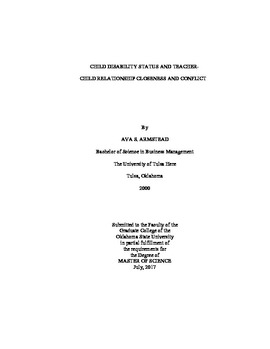| dc.contributor.advisor | Shreffler, Karina | |
| dc.contributor.author | Armstead, Ava S. | |
| dc.date.accessioned | 2018-04-24T15:07:12Z | |
| dc.date.available | 2018-04-24T15:07:12Z | |
| dc.date.issued | 2017-07-01 | |
| dc.identifier.uri | https://hdl.handle.net/11244/299671 | |
| dc.description.abstract | The interactions that occur between teacher and child during the school day dictate many aspects of the educational experience. The teacher-child relationship is an important factor in the early care and education setting. This study examined the relationship between child disability status and teacher child relationships, which are characterized by closeness and conflict. It further assessed the extent to which the relationship was mediated by child temperament (inhibitory control and frustration) and child behaviors (prosocial and aggression). Analyses used data from the Child, Family, and School Influences on Developmental Outcomes of Young Children with and without Disabilities longitudinal study. The sample consisted of parent and teacher reports for 199 children with and without disabilities attending an inclusive child development laboratory school at a Midwestern university. Results indicated that disability status was related to both teacher-child closeness and conflict, specifically that children with disabilities had less reports of closeness and higher reports of conflict in their relationship with teachers. Parent-report of inhibitory control and prosocial behavior were positively related to teacher-report closeness and aggression was negatively related to teacher-report closeness. Parent-report of inhibitory control was negatively related to teacher-report conflict and frustration, and aggression was positively related to teacher-report conflict. There were significant findings for all teacher reported variable on both closeness and conflict. Teacher-report of child frustration and aggression was negatively associated with teacher-child closeness and positively associated with teacher-child conflict. Teacher-report of inhibitory control and prosocial behavior was positively associated with teacher-child closeness and negatively associated with teacher-child conflict. Mediation analyses revealed that parent-report of child inhibitory control and teacher-report of prosocial behavior did mediate the association between disability status and teacher-child conflict. | |
| dc.format | application/pdf | |
| dc.language | en_US | |
| dc.rights | Copyright is held by the author who has granted the Oklahoma State University Library the non-exclusive right to share this material in its institutional repository. Contact Digital Library Services at lib-dls@okstate.edu or 405-744-9161 for the permission policy on the use, reproduction or distribution of this material. | |
| dc.title | Child Disability Status and Teacher-child Relationship Closeness and Conflict | |
| dc.contributor.committeeMember | Merten, Michael | |
| dc.contributor.committeeMember | Tate, Amy | |
| osu.filename | Armstead_okstate_0664M_15396.pdf | |
| osu.accesstype | Open Access | |
| dc.description.department | Human Development & Family Science | |
| dc.type.genre | Thesis | |
| dc.type.material | text | |
